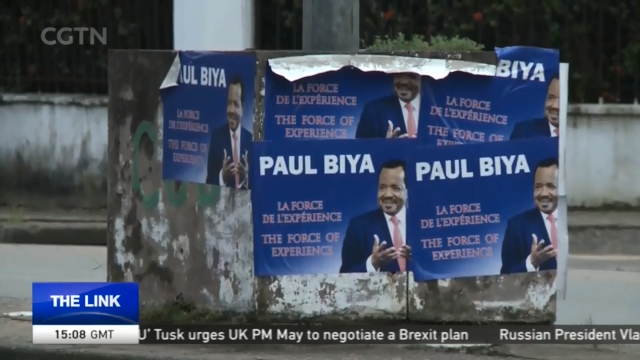
08:36, 05-Oct-2018
Cameroon Elections: President Biya cancels trip to Anglophone region amid tensions
Updated
07:58, 08-Oct-2018
03:46

We turn now to the presidential election in Cameroon, where a separatist insurgency is posing a serious threat to polls slated for Sunday. Peninah has more from our studio in Nairobi. Peninah?
Yes, the Anglophone regions are particularly volatile, with separatists vowing that voting will not take place. Incumbent President Paul Biya, who is seeking a seventh term in office, was due to visit the region this week. But that trip has been cancelled. This means no presidential candidate will visit the conflict-ridden English-speaking regions to solicit for votes before Sunday's polls. CGTN's Saddique Shaban has more details from Yaounde.
Cameroon, Thursday, just three days to the 2018 presidential polls. Residents of central Cameroon, the seat of the francophone region, woke up to the news that President Paul Biya had cancelled a campaign rally to the Anglophone region.
There was no official reason given by the presidency for the late change of plans. Other political parties continued their campaigns, whilst acknowledging the escalating crisis in the English-speaking regions.
FREDRICK TAMNJO, COORDINATOR, NATIONAL UNION FOR DEMOCRACY & PROGRESS "Please put down your guns. Let's talk about peace. And there is nothing more important than peace. So it is what I am thinking as a father he will have them to sit down and try to know what is really wrong because nothing is more important than peace and nothing can be arranged with guns."
In downtown Yaoundé, long-distance transport companies are counting losses for the third week running.
Fearing loss of lives and property, the owners have parked their vehicles after recent cases of violence in Buea and Bamenda. Their livelihoods disrupted, they while away, not sure about when business will resume.
SADDIQUE SHABAN, YAOUNDE, CAMEROON "Ordinarily, these buses would be plying between the capital Yaoundé and the North West and South West regions of Cameroon. But the crisis in the Anglophone region means that these buses are grounded. There are simply no travelers to the region."
JOSEPH NDII, BUS DRIVER "The people are in the state of war in these areas. We have seen death and injuries and witnessed horrific scenes in the past few weeks from Bamenda that has made this business impossible to operate. People cannot continue to stay there, as security is no longer guaranteed. They are fleeing to safety. Our passengers have told us they have seen dead bodies along the way. A lot of people have died."
Despite these fears, about seven million voters are expected to head to the polls on Sunday. The country's elections body held another round of crisis meeting on Wednesday, with the head of the election telling CGTN about voting in these volatile regions.
ESSOSSE ERIK DIRECTOR GENERAL, ELECTIONS CAMEROON "Because of security reasons, we regrouped some polling stations, in administrative jargon, called voting centers. But it does not change the different polling stations. We regrouped polling stations into voting centres. For the displaced, we have transferred them to the new areas where they are residents. So if they come from the North West, for example, they will not vote in the NW, they will cast where they are resident."
The electioneering period has painted a picture of contrast in this Central African Republic. On one hand, the Francophone speakers are warming up for the presidential elections while Anglophone regions continue to remain silent, unsure about their fate in the days ahead. Saddique Shaban, CGTN, Yaoundé, Cameroon.

SITEMAP
Copyright © 2018 CGTN. Beijing ICP prepared NO.16065310-3
Copyright © 2018 CGTN. Beijing ICP prepared NO.16065310-3